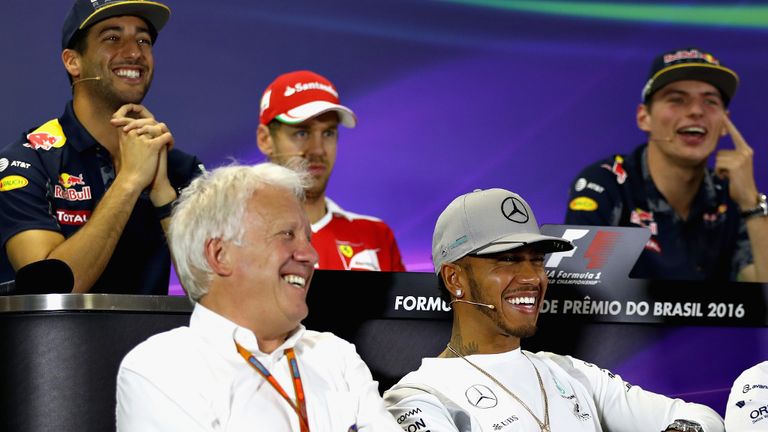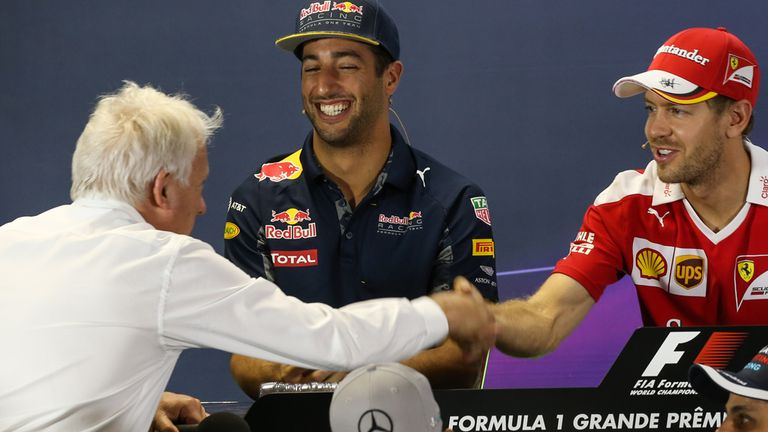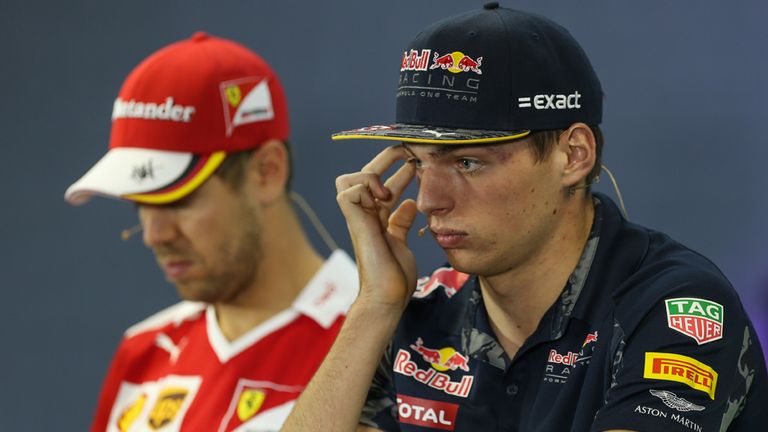Lewis Hamilton and Max Verstappen Mexican GP decisions explained
But apologetic Vettel unhappy with his podium-losing penalty; FIA race director Charlie Whiting appears at drivers' briefing in Brazil
Monday 14 November 2016 15:31, UK
FIA race director Charlie Whiting has explained Lewis Hamilton was not punished for going off track at the Mexican GP because the Mercedes driver did not gain 'a lasting advantage'.
The decision not to penalise Hamilton at the start of the last race was challenged by Red Bull after Max Verstappen was hit by a five-second penalty for, like Hamilton, missing the circuit's first corner.
However, as Whiting revealed immediately after the race to Sky F1's Martin Brundle, data showed from Hamilton's car showed that the Mercedes driver immediately slowed upon returning to the track. Verstappen, on the other hand, was defending from Sebastian Vettel when he lost control of his Red Bull car under braking.
Whiting's explanation was provided in full during a captivating but highly unusual briefing at the end of the traditional pre-event drivers' press conference for this weekend's Brazilian GP when Whiting joined Hamilton, Vettel, Verstappen, Daniel Ricciardo and Williams' Felipe Massa to talk through the incidents.
Hours after Whiting's appearance, Ferrari announced they would appeal against Vettel's demotion, stating that 'a number of new elements had come to light after the decision that make the decison reviewable.' It's understood the appeal was lodged on Wednesday - the night before Whiting's appearance.
Vettel unhappy with his Mexico penalty
The conference provided Vettel with his first public opportunity to discuss his penalty in Mexico after the Ferrari driver was stripped of his podium finish over three hours after the race had finished.
In an incident which was analysed in depth by Whiting in front of the assembled media and the drivers, Vettel was found guilty of moving in the braking zone when trying to hold off Ricciardo on the penultimate lap of the race. Ironically, Vettel was one of the strongest advocates for the rules surrounding such manoeuvres being tightened up in the wake of sustained criticism of Verstappen for similar perceived offences.
But Vettel remained adamant he had done nothing wrong.
"I don't agree with the decision made," said the Ferrari driver. "I gave enough room on the inside, l kept the car straight for the majority of the braking and in my opinion Daniel locked up so badly because there was no grip on the inside. I think it looked worse than it actually was."
Whiting accepts Vettel apology
Whiting was himself speaking publicly for the first time since Vettel launched a foul-mouthed outburst aimed directly at the FIA race director after the four-time world champion became exasperated with Verstappen's refusal to yield.
"It's not the first time that bad language has been used and the fact it was directed at me was unfortunate," said Whiting. "There were a number of mitigating factors which built up to Sebastian's frustrations but the fact he sought me out to apologise...for me, that was enough. I am prepared just to forget it and move on."
The FIA investigated the outburst but decided not to levy a further penalty against Vettel after the Ferrari driver wrote a letter of apology to the governing body.
"I am sorry for what l said," conceded Vettel. "I regret what l said, I didn't mean it and I am happy Charlie has accepted the apology. "
Verstappen's lasting advantage or double standards?
Vettel wasn't alone in expressing his unhappiness with the stewards' post-race verdicts in Mexico.
Along with Red Bull boss Christian Horner, Verstappen felt he had been the victim of double standards when he was demoted from third place for cutting the first corner following Hamilton's let-off.
But according to Whiting, the telemetry from Hamilton's W07 showed the Mercedes driver had "backed off to 80 per cent throttle between turns three and four to give back his advantage".
Turning to the Verstappen incident, Whiting then added: "If Max had done the same thing between turns three and four, he would have certainly have lost his place. So the stewards felt he deserved a penalty because he had gained a lasting advantage. That's the fundamental difference."
With Whiting sitting directly in front of him, Verstappen responded: "Of course I don't agree with the decision. If you give penalties, give it to both or don't give any penalties."
A second 'Verstappen rule' in the future?
But Verstappen also argued that a blanket ban on drivers leaving the track should be imposed to avoid similar future controversy.
"Maybe what we should change in the future is that once you go off you should be penalised instead of the stewards interfering and giving an opinion," said the Red Bull teenager.
"It would be good if we could somehow automatically get some sort of slowing down," agreed Mercedes' Nico Rosberg.
Sky F1 pundit Brundle argued along similar lines in his post-Mexico column for Sky Sports, writing: 'I have believed for many years that in those situations a driver should be made to go through a penalty box area at pit lane speed limit so that he takes some serious pain for his mistake.'
The 'Verstappen rule', which outlaws drivers moving in the braking zone, was also discussed at length with Whiting clarifying the circumstances under which a penalty would be imposed: "Firstly, if a driver has to take avoiding action, if a driver makes an abnormal change of direction in the braking zone and if it is potentially dangerous to another driver. If those three conditions are satisfied then the stewards will feel a penalty should be applied."
Such complexity is likely to confuse rather than excite Formula 1 fans. But as Whiting reflected, simplicity is never simple in F1.
"The whole sport has become more complex. There are continued requests to make things clearer, but the clearer things become the longer, and the more detailed, the rules.
"For example, all the rules around driving could be summed up in one sentence: 'drivers must drive safely'.
"But when you have a simple rule like that, you are continually asked what does that exactly mean, 'can we do this?' and 'can we do that?', and the rule becomes longer and longer…"





